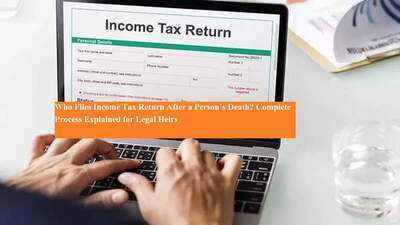

As the deadline for filing Income Tax Returns (ITR) approaches—this year set for September 15, 2025—many taxpayers are busy ensuring compliance and hoping for timely refunds. But an important question often arises: What happens if a taxpayer passes away before filing their ITR? Who takes on the responsibility of filing, and how are refunds or pending tax liabilities handled?
The Income Tax Act, 1961, clearly outlines the process in such unfortunate circumstances. Let’s break down, step by step, who files the return of a deceased person, how legal heirs can claim refunds, and what challenges may arise in the process.
Who Can File the ITR of a Deceased Person?According to Section 159 of the Income Tax Act, 1961, the responsibility of filing the final ITR of a deceased person lies with either:
-
The legal heir (such as spouse, children, or other rightful successors), or
-
The executor of the will (if the deceased has left behind a will).
The chosen representative must report all income earned by the deceased up to the date of death. If a will exists, the executor is required to manage not only pre-death income but also any income generated after death (such as rent, dividends, or interest from assets).
It is important to note that a nominee—often registered in bank accounts or insurance policies—does not automatically gain the right to file ITR unless they are also a recognized legal heir.
Claiming Refunds or Adjusting TDSIf the deceased taxpayer had excess tax deducted at source (TDS) or was eligible for an income tax refund, the legal heir can claim it. For this, the heir must first register as a “Representative Assessee” on the Income Tax e-filing portal.
The following documents are typically required:
-
PAN of the deceased
-
Death certificate
-
Proof of legal heirship (such as legal heir certificate, succession certificate, or family pension certificate)
-
PAN of the legal heir
-
Bank account details of the heir
Once registered, the heir can file the ITR on behalf of the deceased and ensure any refund is directly credited to their validated bank account.
Steps to Register as a Legal Heir on the Income Tax PortalLog in to the Income Tax e-filing portal.
Navigate to the “My Account” section.
Select “Add/Register as Representative”.
Choose the option “Legal Heir”.
Enter the deceased person’s PAN, date of death, and bank details.
Upload the death certificate, proof of heirship, and your own PAN details.
Submit the request for verification.
Once approved, the heir can proceed with filing the ITR and claiming refunds, if applicable.
Common Challenges for FamiliesWhile the law provides a clear mechanism, families often face hurdles in completing the process:
-
Delays in obtaining succession certificates or heirship proofs: These documents may take weeks or even months to secure, which can stall the entire process.
-
Refund stuck in inactive bank accounts: If the deceased’s account is closed, refunds may fail to process. In such cases, the heir must request a refund reissue online.
-
Document rejections: Submitting incomplete or incorrect papers may lead to rejection of the legal heir registration.
-
Disputes among multiple heirs: If more than one legal heir exists and consensus is lacking, the process can become complicated and time-consuming.
-
The final ITR of a deceased taxpayer must be filed by a legal heir or executor.
-
Legal heirs must register on the e-filing portal with proof of heirship before filing.
-
Refunds or excess TDS are transferred to the heir’s validated bank account.
-
Timely documentation and bank account pre-validation are crucial to avoid refund delays.
-
Families should initiate the process early to prevent last-minute stress during the tax deadline.
Filing the ITR of a deceased person may feel overwhelming during an already difficult time, but the Income Tax Act provides a structured path for heirs to handle obligations responsibly. Ensuring compliance not only fulfills the legal duty but also secures rightful financial refunds for the family.
-
VIDEO: 'Outer Mein Chhor Dete Hain,' Say Municipal Workers After Animal Activists Question Over Negligent Treatment Towards Stray Dogs In MP's Sagar

-
UAE: How dress to impress on the daily school run

-
Coronation Street legend shows 'collapsing' face as she 'bares all'

-
Ravi Patneedi: Pioneering SAP Innovations for Digital Transformation

-
Indian Rupee Hits Record Low Amid Economic Concerns and Protests
